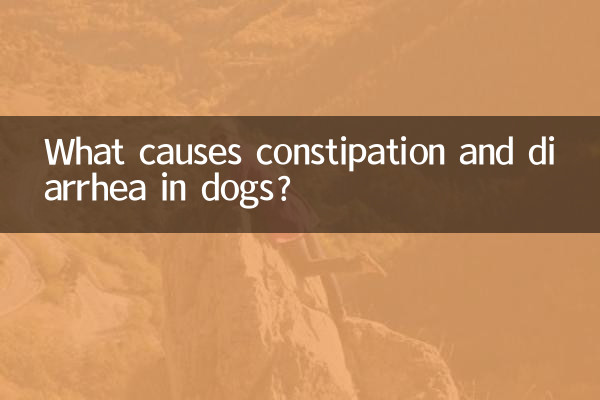What causes constipation and diarrhea in dogs?
In the past 10 days, among the hot topics about pet health, "dog constipation and diarrhea" has become the focus of many pet owners. Gastrointestinal problems in dogs not only affect their health, but also make owners anxious. This article will analyze this problem in detail for you from four aspects: causes, symptoms, treatment and prevention, based on recent hot topics on the Internet.
1. Common causes of constipation and diarrhea in dogs

Constipation and diarrhea in dogs may be caused by a variety of factors. Here are some of the most discussed causes recently:
| Type | specific reasons |
|---|---|
| dietary problems | Food intolerance, sudden food changes, ingestion of foreign objects (such as bones, toy fragments) |
| disease factors | Gastroenteritis, parasitic infection, pancreatitis, intestinal obstruction |
| environmental pressure | Moving, adding a new pet, or the owner being away for a long time |
| Others | Dehydration, lack of exercise, medication side effects |
2. Comparison of symptoms of constipation and diarrhea
The symptoms of constipation and diarrhea are very different, but both can make your dog uncomfortable. The following are typical symptoms recently shared by pet doctors:
| Question type | Symptoms |
|---|---|
| constipation | Difficulty defecation, dry and hard stools, reduced defecation frequency (<3 times/week), and decreased appetite |
| diarrhea | Loose or watery stools, increased bowel movements, possibly blood or mucus, and listlessness |
3. Recently hotly discussed treatment methods
For dogs’ constipation and diarrhea, the most discussed treatments recently include:
| Question type | home care | medical intervention |
|---|---|---|
| constipation | Increase water intake, feed pumpkin puree, and exercise moderately | Kaiselu (used under the guidance of a veterinarian), enema |
| diarrhea | Fast for 12-24 hours and feed easily digestible food (such as white porridge) | Antidiarrheal drugs, antibiotics (need to be prescribed by a veterinarian) |
4. Preventive measures (recent popular suggestions)
Prevention is better than cure. Here are the effective prevention methods recently recommended by pet experts:
| prevention direction | Specific measures |
|---|---|
| Diet management | Feed regularly and quantitatively, change food gradually, and avoid feeding high-fat foods to humans |
| health monitoring | Regularly deworm, observe feces status, and record defecation frequency |
| environmental adaptation | Reduce environmental changes, provide adequate drinking water, and maintain appropriate exercise |
5. When do you need medical treatment?
According to the medical treatment guidelines shared by veterinarians recently, you should take your dog to the doctor immediately if the following situations occur:
1. Constipation for more than 3 days and home care is ineffective
2. Diarrhea lasts for more than 24 hours, or is accompanied by vomiting
3. Blood or abnormal color in the stool (such as white, black)
4. The dog shows obvious pain or is extremely lethargic
6. Recent popular questions and answers
Q: Can dogs with constipation be fed vegetable oil?
A: Veterinarians recently recommended that a small amount (1/2 teaspoon) of vegetable oil may help lubricate the intestines, but excessive amounts can cause diarrhea.
Q: Are probiotics effective for dogs with diarrhea?
A: Recent studies have shown that specific strains (such as Saccharomyces boulardii) are helpful for acute diarrhea, but you need to choose pet-specific products.
From the above analysis, it can be seen that dogs’ constipation and diarrhea problems require careful observation and scientific response by owners. Regularly recording your dog's diet and bowel movements can help detect problems early. If symptoms persist or worsen, be sure to consult a professional veterinarian promptly.

check the details

check the details